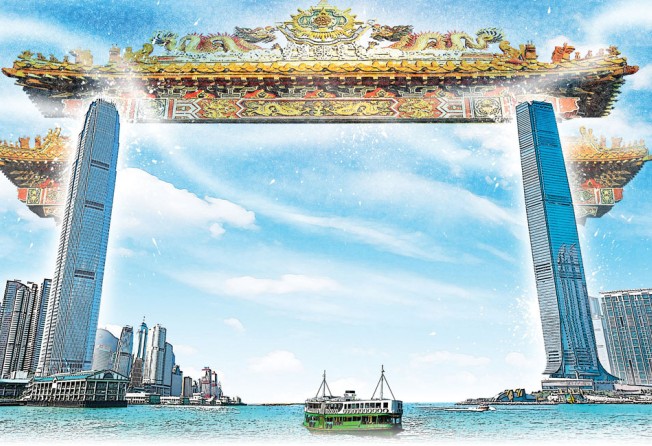Hong Kong must prepare for a China fully open to the world
Debate throws spotlight on the future challenges facing Hong Kong and how it must adapt amid the inevitable competition from mainland cities

Hong Kong must prepare for the day when China opens fully to the world, changing forever the city's traditional role as a gateway to the Middle Kingdom, a senior Hong Kong government official says.
Secretary for Financial Services and the Treasury Professor Chan Ka-keung told a seminar organised by the South China Morning Post that the city needed to catch up to the changing circumstances on the mainland as its economic development reached a new level.
"China will be eventually completely open. Hong Kong's ability to grow as the unique gateway when China is closed - that day will sooner or later be over," Chan told the audience at the "Redefining Hong Kong" seminar at the JW Marriott hotel.
Chan was one of five panellists debating the question of "The role of Hong Kong as the Ever-Evolving Gateway to and for China" at the seminar, moderated by the Post's financial services editor, George Chen.
"We should not be afraid … The more open China is, even though that means more competitions from other Chinese cities, it will provide Hong Kong with more opportunities," Chan said.
"The opening up of China in the past 30 years has brought Hong Kong more opportunities, not fewer," he said.
The city has enjoyed spectacular success as the closest international capital market to China and taken advantage of its plentiful supply of professionals and effective, clean legal system.
Now, it acts as another sort of gateway, as a testing ground for new policies, such as the internationalisation of the yuan and capital market reform.
But doubts have grown in recent years about how it can stay ahead of the game when the nation is fully opened up and its currency fully convertible.
"Hong Kong's gateway role has always been changing," Chan said, adding that the city should eventually be "a gateway to provide the best services" when the mainland is fully open. But fellow panelist Vincent Lo Hong-shui, chairman of Shui On Group, took a more pessimistic view, pointing to the rising threat of competition from mainland cities. He said the political situation was his biggest concern for the future of Hong Kong.
"The cities in China have really moved up quite a bit. In the past, I think they really looked up to Hong Kong, but now I think they don't," Lo said, adding that Hong Kong people should not continue to "behave in a superior way".
As well as identifying Shanghai as host of the mainland's first free-trade zone, Beijing has designated several experimental economic zones to act as testing grounds for new policies.
For example, the central government in June last year designated Qianhai, a 15-square-kilometre site in western Shenzhen, as a testing ground for the removal of capital controls. It has visions of turning the site, an hour's drive from Hong Kong, into the "Manhattan of the Pearl River Delta" with a gross domestic product reaching 150 billion yuan (HK$188 billion) by 2020.
Benjamin Hung Pi-cheng, executive director and CEO of Standard Chartered Bank (Hong Kong), is more optimistic. He points to the potential opportunities from the internationalisation of the yuan. "Hong Kong has never been in a better position" in the past three or four decades, Hung said, adding that Beijing's determination to globalise its currency would bring huge opportunities for the city.
Albert Ng, regional managing partner at Ernst & Young, also said "opportunities are even greater than in the past", and said that recent financial scandals on the mainland, which have affected investor confidence in mainland firms, would not stop the city attracting mainland businesses to list in Hong Kong.
John Slosar, chief executive at Cathay Pacific, said the growing appetite for travel as a result of the accumulation of wealth on the mainland would be one of the biggest game-changers for the aviation industry in the coming years. Just 15 million outbound trips are made from the mainland every year now, a figure that would grow to 200 million by 2030, he said.
THREE QUESTIONS
Q: Is there anything stopping you building another Xintiandi (an urban shopping and entertainment attraction built by Shui On in a historic district of Shanghai and later repeated in other mainland cities) in Hong Kong?
Vincent Lo: Our first [Hong Kong] chief executive Tung Chee-hwa also mentioned that to me when he visited Xintiandi in Shanghai. I said we didn't have old buildings. We have torn down everything.
John Slosar: A great city that attracts people, that has character, tends to have an interesting, diversified, attractive restaurant district, where people go in the evening.
Vincent Lo: Allan Zeman [of Lan Kwai Fong Holdings] might disagree with you. Every time I see him I would say Lan Kwai Fong is so ugly. He would say, "Vincent, yours is very beautiful, but I have all the beautiful people".
Q: If you could make one suggestion to the government, what would it be?
Albert Ng: Hong Kong only has a small population and small market. If we are able to allow Hong Kong accountants to practise in China, that would open up a lot of opportunities.
Vincent Lo: Hong Kong people were trained to have many superiors. But things have moved on.
Q: What is the first thing that comes to mind when people ask you why you like Hong Kong?
Albert Ng: I call Hong Kong home
Benjamin Hung: Banks work here.
John Slosar: We don't have oil, natural gas, minerals … what we do have is the energy and resources of all Hong Kong people, which enable us to adapt to the changing environment.
Professor Chan Ka-keung: The great city lifestyle.
Vincent Lo: We in Hong Kong are enjoying great opportunities because of the transformation in China.